Background
Ritchie, Donald A. was born on December 23, 1945 in New York City, New York, United States. Son of Arthur V. and Jeannette M. Ritchie.

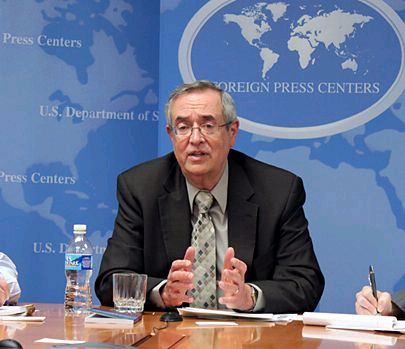
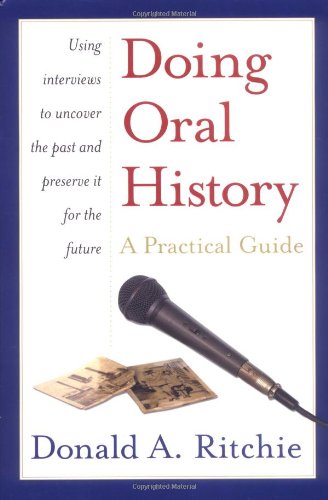
(Oral history is vital to our understanding of the culture...)
Oral history is vital to our understanding of the cultures and experiences of the past. Unlike written history, oral history forever captures people's feelings, expressions, and nuances of language. But what exactly is oral history? How reliable is the information gathered by oral history? And what does it take to become an oral historian? Donald A. Ritchie, a leading expert in the field, answers these questions and in particular, explains the principles and guidelines created by the Oral History Association to ensure the professional standards of oral historians. Doing Oral History has become one of the premier resources in oral history. It explores all aspects of the field, from starting an oral history project, including funding, staffing, and equipment to conducting interviews; publishing; videotaping; preserving materials; teaching oral history; and using oral history in museums and on the radio. In this second edition, the author has incorporated new trends and scholarship, updated and expanded the bibliography and appendices, and added a new focus on digital technology and the Internet. Appendices include sample legal release forms and information on oral history organizations. Doing Oral History is a definitive step-by-step guide that provides advice and explanations on how to create recordings that illuminate human experience for generations to come. Illustrated with examples from a wide range of fascinating projects, this authoritative guide offers clear, practical, and detailed advice for students, teachers, researchers, and amateur genealogists who wish to record the history of their own families and communities.
http://www.amazon.com/gp/product/0195154347/?tag=2022091-20
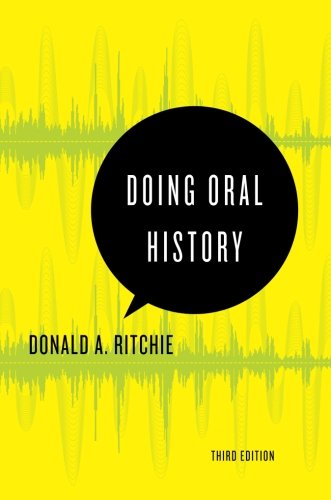
(Doing Oral History is considered the premier guidebook to...)
Doing Oral History is considered the premier guidebook to oral history, used by professional oral historians, public historians, archivists, and genealogists as a core text in college courses and throughout the public history community. Over the past decades, the development of digital audio and video recording technology has continued to alter the practice of oral history, making it even easier to produce quality recordings and to disseminate them on the Internet. This basic manual offers detailed advice on setting up an oral history project, conducting interviews, making video recordings, preserving oral history collections in archives and libraries, and teaching and presenting oral history. Using the existing Q&A format, the third edition asks new questions and augments previous answers with new material, particularly in these areas: 1. Technology: As before, the book avoids recommending specific equipment, but weighs the merits of the types of technology available for audio and video recording, transcription, preservation, and dissemination. Information about web sites is expanded, and more discussion is provided about how other oral history projects have posted their interviews online. 2. Teaching: The new edition addresses the use of oral history in online teaching. It also expands the discussion of Institutional Review Boards (IRBs) with the latest information about compliance issues. 3. Presentation: Once interviews have been conducted, there are many opportunities for creative presentation. There is much new material available on innovative forms of presentation developed over the last decade, including interpretive dance and other public performances. 4. Legal considerations: The recent Boston College case, in which the courts have ruled that Irish police should have access to sealed oral history transcripts, has re-focused attention on the problems of protecting donor restrictions. The new edition offers case studies from the past decade. 5. Theory and Memory: As a beginner's manual, Doing Oral History has not dealt extensively with theoretical issues, on the grounds that these emerge best from practice. But the third edition includes the latest thinking about memory and provides a sample of some of the theoretical issues surrounding oral sources. It will include examples of increased studies into catastrophe and trauma, and the special considerations these have generated for interviewers. 6. Internationalism: Perhaps the biggest development in the past decade has been the spreading of oral history around the world, facilitated in part by the International Oral History Association. New oral history projects have developed in areas that have undergone social and political upheavals, where the traditional archives reflect the old regimes, particularly in Eastern Europe, the Middle East, Asia, Africa, and Latin America. The third edition includes many more references to non-U.S. projects that will still be relevant to an American audience. These changes make the third edition of Doing Oral History an even more useful tool for beginners, teachers, archivists, and all those oral history managers who have inherited older collections that must be converted to the latest technology.
http://www.amazon.com/gp/product/0199329338/?tag=2022091-20
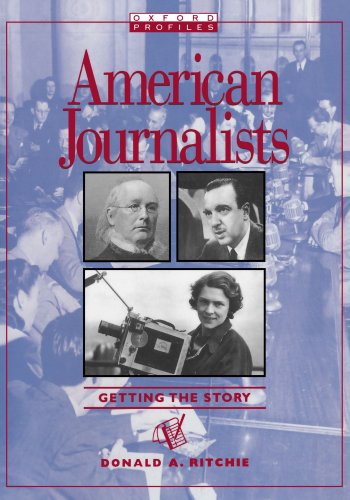
(In 60 essays, this volume profiles American journalists f...)
In 60 essays, this volume profiles American journalists from colonial times to the present--reporters, editors, publishers, photographers, and broadcasters--whose careers reflected major developments in their profession and in the history of the United States. In a speech to Newsweek correspondents in 1963, publisher Philip Graham described journalism as "the first rough draft of history." These journalists confronted and helped to shape the discussion of major issues and events in American history, from the American revolution through abolition, westward expansion, the Civil War, the civil rights movement, immigration, and the women's movement, as well as major constitutional issues involving the First Amendment protection of freedom of the press. Biographies of well-known journalists, from Benjamin Franklin and Thomas Paine to Walter Cronkite and Rupert Murdoch, appear alongside some who may be less familiar, such as Elias Boudinot, founder of the first Cherokee language newspaper; Abraham Cahan, editor of the Jewish Daily Forward; and Daniel Craig, who in the 1830s used carrier pigeons to ferry the news. Other subjects include Margaret Green Draper, the revolutionary printer; Claude Barnett, founder of the Associated Negro Press; photojournalist Margaret Bourke-White; war correspondent Ernie Pyle; and Allen Neuharth, founder of USA Today. Illustrations, fact boxes, and quotations from the subjects themselves make this volume an indispensable reference for students of American history as well as a fascinating read. Journalists profiled include: Horace Greeley Frederick Douglass Mark Twain Thomas Nast Joseph Pulitzer Nellie Bly William Randolph Hearst Ida Wells-Barnett H. L. Mencken Dorothy Thompson Walter Winchell Red Smith Edward R. Murrow Walter Cronkite Bernard Shaw Cokie Roberts Manuel de Dios Unanue and many more
http://www.amazon.com/gp/product/019532837X/?tag=2022091-20
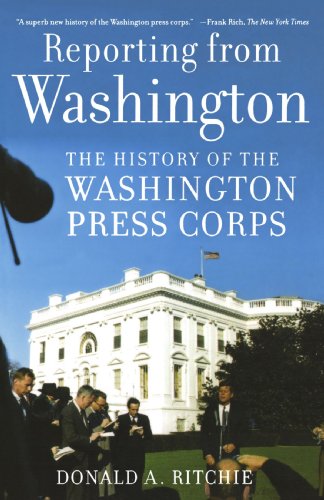
(Donald Ritchie offers a vibrant chronicle of news coverag...)
Donald Ritchie offers a vibrant chronicle of news coverage in our nation's capital, from the early days of radio and print reporting and the heyday of the wire services to the brave new world of the Internet. Beginning with 1932, when a newly elected FDR energized the sleepy capital, Ritchie highlights the dramatic changes in journalism that have occurred in the last seven decades. We meet legendary columnists--including Walter Lippmann, Joseph Alsop, and Drew Pearson --as well as the great investigative reporters, from Paul Y. Anderson to the two green Washington Post reporters who launched the political story of the decade--Woodward and Bernstein. We read of the rise of radio news--fought tooth and nail by the print barons--and of such pioneers as Edward R. Murrow, H. V. Kaltenborn, and Elmer Davis. Ritchie also offers a vivid history of TV news, from the early days of Meet the Press, to Huntley and Brinkley and Walter Cronkite, to the cable revolution led by C-SPAN and CNN. In addition, he compares political news on the Internet to the alternative press of the '60s and '70s; describes how black reporters slowly broke into the white press corps (helped mightily by FDR's White House); discusses path-breaking woman reporters such as Sarah McClendon and Helen Thomas, and much more. From Walter Winchell to Matt Drudge, the people who cover Washington politics are among the most colorful and influential in American news. Reporting from Washington offers an unforgettable portrait of these figures as well as of the dramatic changes in American journalism in the twentieth century.
http://www.amazon.com/gp/product/0195308921/?tag=2022091-20
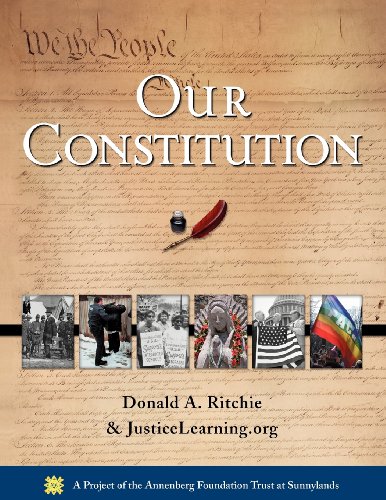
(An in-depth look at the entire text of the U. S. Constitu...)
An in-depth look at the entire text of the U. S. Constitution, annotated with detailed explanations of its terms and contents. Each Amendment and Article is accompanied by sidebar material on the history of its application, including profiles of important Supreme Court cases, texts of related primary source documents, and contemporary news articles. Double page timelines for several of the Articles and all the Amendments highlight important events and legal cases. Visually stunning, with facsimile reproductions of primary source documents, paintings, phots, and historical artifacts, Our Constitution is perfect for history students.
http://www.amazon.com/gp/product/0195325699/?tag=2022091-20
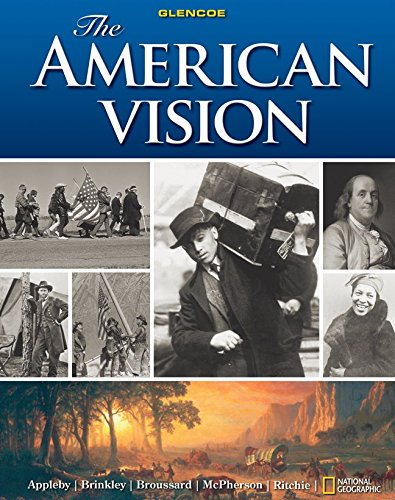
(Incorporate research-based reading strategies to give all...)
Incorporate research-based reading strategies to give all your students access to the rich history of the United States. The program includes the finest scholarship and the most up-to-date maps from National Geographic.
http://www.amazon.com/gp/product/0078799848/?tag=2022091-20
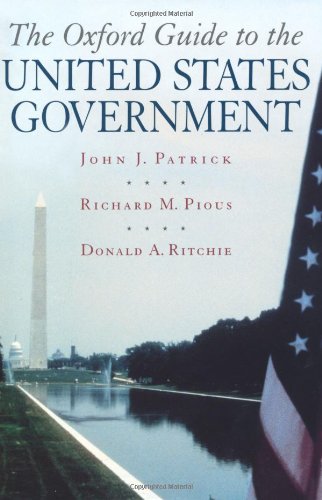
(The Oxford Guide to the United States Government is the u...)
The Oxford Guide to the United States Government is the ultimate resource for authoritative information on the U.S. Presidency, Congress, and Supreme Court. Compiled by three top scholars, its pages brim with the key figures, events, and structures that have animated U.S. government for more than 200 years. In addition to coverage of the 2000 Presidential race and election, this Guide features biographies of all the Presidents, Vice Presidents, and Supreme Court Justices, as well as notable members of Congress, including current leadership; historical commentary on past elections, major Presidential decisions, international and domestic programs, and the key advisors and agencies of the executive branch; in-depth analysis of Congressional leadership and committees, agencies and staff, and historic legislation; and detailed discussions of 100 landmark Supreme Court cases and the major issues facing the Court today. In addition to entries that define legal terms and phrases and others that elaborate on the wide array of government traditions, this invaluable book includes extensive back matter, including tables of Presidential election results; lists of Presidents, Vice Presidents, Congresses, and Supreme Court Justices with dates of service; lists of Presidential museums, libraries, and historic sites; relevant websites; and information on visiting the White House, the Capitol, and Supreme Court buildings. A one-stop, comprehensive guide that will assist students, educators, and anyone curious about the inner workings of government, The Oxford Guide to the United States Government will be a valued addition to any home library.
http://www.amazon.com/gp/product/019514273X/?tag=2022091-20

('Press Gallery' examines the lives of Greeley, Horace Whi...)
'Press Gallery' examines the lives of Greeley, Horace White, Ben Perley Poore, Emily Briggs, Jane Grey Swisshelm, James G. Blaine, and others who were positioned in the hub of government when the Civil War, the purchase of Alaska, the Credit Mobilier scandal, and the Johnson impeachment hearings were making front-page news.
http://www.amazon.com/gp/product/0674703758/?tag=2022091-20
Ritchie, Donald A. was born on December 23, 1945 in New York City, New York, United States. Son of Arthur V. and Jeannette M. Ritchie.
He graduated from the City College of New York in 1967. And received a master"s degree, in 1969, and a Doctor of Philosophy, in 1975, from the University of Maryland, College Park.
He served in the United States. Marine Corps from 1969 to 1971. In 2009 he became the Senate historian, succeeding Richard Baker, and held that post until his retirement in 2015. Ritchie was responsible for editing the closed hearing transcripts of Senator Joseph R. McCarthy"s investigations, and has authored a number of books including Electing Franklin Delano Roosevelt. He has served as president of the Oral History Association and on the councils of the American Historical Association and the International Oral History Association, as well as on the board of the Society for History in the Federal Government.
(In 60 essays, this volume profiles American journalists f...)
(Doing Oral History is considered the premier guidebook to...)
(Donald Ritchie offers a vibrant chronicle of news coverag...)
('Press Gallery' examines the lives of Greeley, Horace Whi...)
(Incorporate research-based reading strategies to give all...)
(The Oxford Guide to the United States Government is the u...)
(Oral history is vital to our understanding of the culture...)
(An in-depth look at the entire text of the U. S. Constitu...)
(Book by Ritchie, Donald)
Member of Intenrat. Oral History Association (council member since 2004), National Council on Public History (nominating committee 1992-1995), Society for History in the Federal Government (council member 1989-1991), Organization of America Historians (nominating board 1985-1987), American History Association (council member 1992-1996), Oral History Association (president 1986-1987), Arts and Humanities Alumni Association, University of Maryland 2002-2004.
Married Anne G. Campbell, June 18, 1988. Children: Jennifer Reid, Andrea Campbell.
